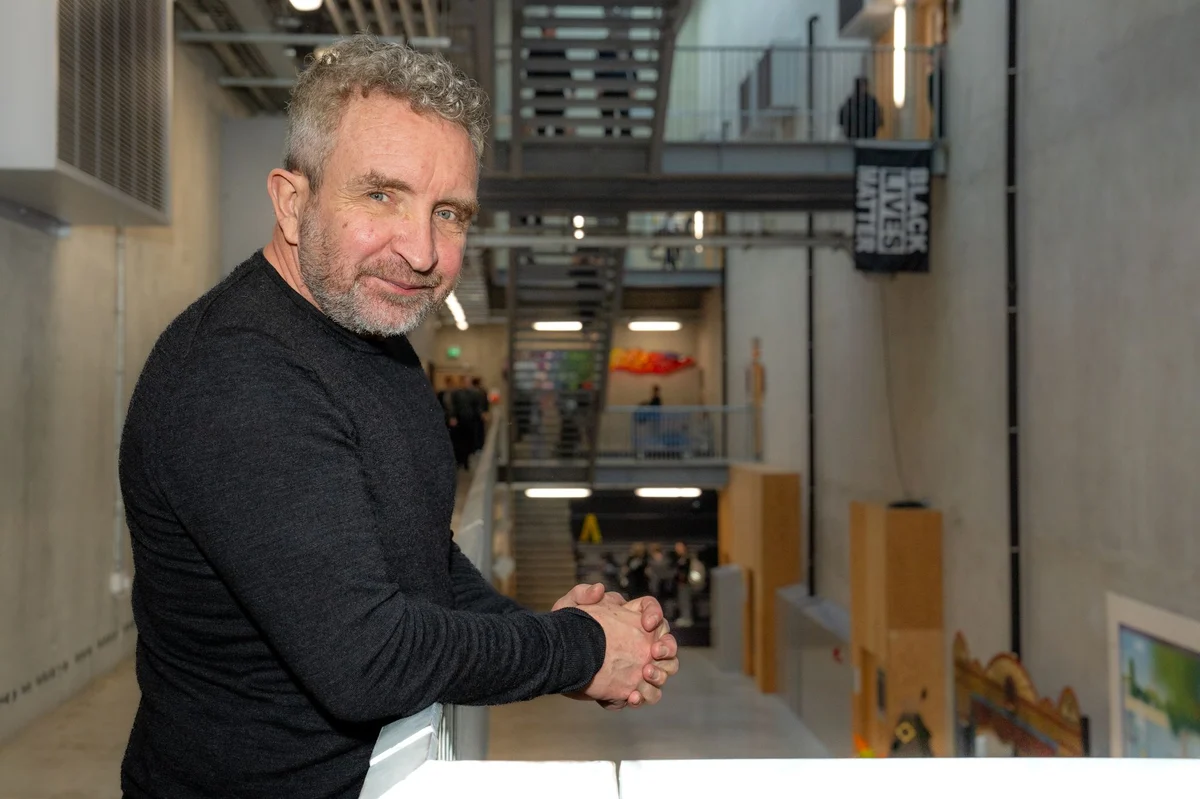Copyright standard

Most actors are much smaller in real life than the screen versions. With Eddie Marsan, the opposite is true. As the character actor par excellence, his physicality often matches the sidekicks and villains and compromised men he plays, but in person he is broad, open and the kind of presence that fills a room, or in this case, a student cafe at Mountview drama school in Peckham. Mountview has just announced Dame Elaine Paige, Eddie Marsan OBE and Giles Terera MBE as its first ever Vice Presidents as part of its 80th year celebrations. They join Dame Judi Dench - “The guvnor,” smiles Marsan - who has been President of the school since 2006. The role of Vice President is an ambassadorial one awarded to exemplars in the field of the performing arts formalises the longstanding relationship Mountview has with the three. Speaking to Marsan, you can see exactly why he is tailor-made to be a role model and ambassador for the school. Firstly, as a boy from Bethnal Green, his dad a lorry driver, he was not a likely bet for carving out a career in Hollywood. Yet, after almost stumbling onto a film set he fell in love with what he saw, and at 21, abandoned an apprenticeship to join the old Mountview in Wood Green to set off on an incredible journey which has seen him work with everyone from Scorsese to Mike Leigh to Spielberg. “Look at this place,” he says about the impressive, buzzing school which sits opposite Peckham Pulse leisure centre and behind Peckham Library, “It's in the heart of a community. I'm a great believer in acting and drama being accessible. Because it's not necessarily an academic art form, it's more visceral, it's collaborative and it's interpretive. Drama schools are often isolated from a lot of communities as if acting is this big secret. Well, when I joined Mountview 30 years ago, I came from being an apprentice printer with no academic qualifications and they taught me how to act, you know. I love the idea that this place is so part of the community, because I think art and creativity and storytelling should be accessible to people, art and creativity. That's why I'm really proud to be part of it, especially a place that's right in the middle of Peckham. I love it.” Arts funding cuts have become so commonplace for so long that it’s almost become just what governments do, and as cultural practices slip from curriculums and communities, it has become harder for working-class children to access their creativity. It seems much of the acting world is dominated by the upper classes, those who can afford to pay for elite drama school fees and with enough money behind them to be able to try the highly competitive acting game without the worry over unemployment. The risk is that acting, or any creative endeavour, becomes filled with bored rich kids who are playing with the arts for fun. Which can’t be good for a vibrant scene in a city like London. And it creates a loop where children from poorer communities simply think that the arts is not for them. “I felt like that really, but then I went to Mountview,” says Marsan, “ I think that people make a big mystery of the art form. And they make a big mystery out of it so some people can be holding it all [for themselves], to make it unattainable. I don't think there is a big mystery to it. It's hard work and there's a lot of complexity. But these are only multiple simplicities and if you teach people that, then they have the courage to to enter into it, to expand and to transcend their ideas of themselves, which is what you should do.” And here we are with the other reason why Marsan is the perfect role model and ambassador. It’s not simply his life background but his expert and passionate knowledge of acting itself. Of how to do it well but also what it can do for people, even if you don’t end up on a film set. He continues, “You should encourage people to explore their artistic tendencies because it transcends their ideas of themselves. And if there's one thing we need in this society it’s that. Some children who are academically gifted, they could sit down and write you an essay for two hours. But some children are better when you put them on a stage for two hours. People don't realise that when a stage is in the dark it's a very safe place, where they're allowed to visually explore the subject matter. For a child who is shy or reticent or being bullied, to suddenly be given that calming space where they can explore complex ideas in a safe environment, is priceless.” He recounts his first encounter with acting, which led to his own journey onto a stage: “I was dancing in a club in Hackney, me and my mate Emmanuel. Some people saw Emmanuel really because he was really good looking, a mixture of Sidney Poitier and Harry Belafonte, and they said to Emmanuel, do you want to be an extra in a film? He said, “Yeah, but can I take Eddie with me?’ I went on the film set and saw somebody do a scene and I said, ‘I want to be an actor,’ and that was it. But when I then first came to Mountview, my first year was paid by an East End bookmaker, and then him and my mum raised the money for the 2nd year and then Mount gave me a scholarship for the 3rd year. I needed to get my community to help.” With fees now so high, the situation hasn’t exactly improved on this front without the use of loans, but this is about perception as much as anything, the belief that you can actually access that world and also of knowing what acting is all about. Anyone going into it in search of fame and fortune is not going to go very far, says Marsan. “It's not about showing off,” he says, “It’s not about you, right? It's a collaborative art form. It's an act of generosity, an act of courage. You have to be self-aware, honest about yourself. And there are certain techniques you learn. It's not about impressing an audience. It's not about what an audience thinks of you, it's what an audience think of the play. Some actors go on stage and they're like rock stars. I was never like a rock star. My job isn't to be admired, my job is to be believed. There's a difference.” Listening to him, you realise that he’s a unique proposition, part-East End no-bullshit craftsman, part-guru , an acting samurai who has dedicated himself to such a degree that he’s tapped into the special undefinable qualities of acting, those that it a transcendent experience to accomplish and to watch. He meditates and says what he loves about acting is that, “You learn to see things from other people's perspective and that helps you transcend the force myth of there being a fixed self. That's what I love most of all about acting and that's why I think we can all benefit from it. One of the things I always teach kids is there's no fixed self. You have to transcend yourself. Also, don't let anybody define you. Don't let people define you based on your class, or ethnicity, your sexuality or gender. Like I will say to young kids, ‘If any of you are gay, asked to play a straight part. And if you’re straight, ask to be cast in a gay role.’ It’s not about who does it, it’s how you do it, and it makes you understand other people’s perspectives’.” He must be incredible in lessons. But the point here is he wants to show the live-enhancing path into acting to others too. And that it really is a path, not a roped-off VIP red carpet. “I just gave a talk to students today and there was one lovely young girl who said, ‘I'm not very good at socialising and I've been told that I have to network, so what can I do?’ I said to her, ‘I never got a job from the party ever. I never got a job from going to a premiere, from going to a function. I only ever got jobs because I was good at my job. And the only reason I was good at my job because I studied other people who were good at their jobs and I worked out how they did it and I did it with them. I looked at Tim Spall and I thought I want to be like him. I looked at Jim Broadbent and I thought I want to be like him. And I realized how hard they work and I thought, well, I've got to work as hard as them. If you don't work hard, it doesn't come, you know.’ There's no big secret to acting or anything. It's about having the ability to sit with complexity and nuance and paradox because human beings are complex and the nuanced and they're paradoxical. And the way you sit with that is you learn to bring in complexity, but you do that through multiple simplicity and you do it in a relaxed manner. You don't force it.” This is part of the reason why he is not against method acting, as you might think he would be. In his view, what might seem like a show-off actor’s whim is in fact a utilitarian route to good work. He has incredible first-hand experience of this on one of Scorsese’s sets. “I worked with Daniel Day-Lewis on Gangs in New York for nine months. And Daniel was playing Bill and Butcher, and he always kept within the physicality of the role, the accent, the physicality and everything. And the reason he was doing that was because he didn't want to go on screen to act he wanted it to be second nature on screen. He didn't want to think about it. But when I was with Daniel, I could always say, ‘Bill, have you seen that article in The Guardian?’ and he would talk to me about anything. What he was doing really was maintaining certain given aspects of characters, so when he was on screen, he could think about the the initial context. So if someone was playing you, they wouldn't want to have to be physically think about physically being you as well as thinking about how you're going about your day. You don't do that. There's aspects of you that are subconscious, that's just spontaneous. Well, that's what he was doing. I always found him lovely. He was just dedicated.” Marsan also tried this out himself in one of his most acclaimed roles. “When I did Ray Donovan for 9 years and played some with Parkinson's, I kept the Parkinson's all day long. I studied Parkinson's sufferers, I studied their symptoms and I maintained that all day long because when I'm on screen, I don't wanna be thinking about how I'm shaking. All I want to be doing is talking to someone because Parkinson's sufferers aren't thinking about how am I gonna shake, they're thinking about the context of the day.” He breaks the psychology down further. “With acting, what you're doing is you're creating a human being on on stage or on camera, right? So there are thoughts within you that are long term thoughts, things that have been with you since you were seven years old, when you weren’t invited to a birthday party or something. That's in the background somewhere, always there, but then your immediate purpose might be something like ‘I want to get this job’. All you're doing is you're spinning that plate and that plate. Now that background plate has to be there all the time, so through frequent repetitive thinking, you're creating a subconscious for the character. What a subconscious does, is it spontaneously expresses itself, and those are the magic things that you see on screen.” This is the kind of gem you get every few minutes with Marsan, like someone showing you how a magic trick works. And this is entirely the point of his presence at the school. Showing the mechanisms behind the disappearing bunnies. Both the experience of acting and entering the profession are made achievable here for young people in the area - “It’s not impossible. It’s a very logical process. It’s just an exercise in empathy. The problem is that we’re cutting it back in schools.” The problem, as he sees it, is part of a wider trend social trend which encompasses the social media age. “Theatre and film are a collaborative art form and we're not living in a collaborative society. We're living in a society where the individual is valued over the collective. Although there's a balance to find between the individual and the collective, always, this art form, is a collaborative and an interpretive art form.” Marsan won’t be taking classes as such at Mountview but alongside Paige and Terera, will be joining Dame Judi - who has represented the school since the 70s - in spreading the welcoming word for the school and continuing to give voice to the importance of the arts to actual day-to-day lives. Far from a frivilous, ‘soft’ kind of education, there is something fundamentally human here which every person can benefit from. “What I love about this place and what I love about the people who run this, the whole team behind this, Sally Ann [Gritton, Principal and CEO] and the teachers and the students is I want this to be a place where you can come in and try things out,” he says, “Come in and explore yourself. One of the things I always my ethos as an actor is ‘nothing human is alien to me’. So let people come in here and realise that nothing is alien. Let them explore other people, other cultures, other sexualities, other religions. Let them explore human existence from different perspectives within drama. For me, that's essential.” Let’s face it, we could all do with a bit of Eddie Marsan in our lives. The students here are in the right place.



